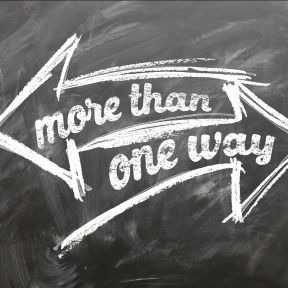MOTIVATION- Harmonize Your Life Through Flexibility. New science supports flexibility over perfection when it comes to persistence. Reviewed by Abigail Fagan

KEY POINTS-
- Newly published research categorizes two types of behavioral persistence: rigid and flexible.
- Only flexibility cultivated harmony between one's target goals and greater life.
- This perfect imperfect option can help you achieve your goals and find harmonious balance.
I’ve said it before and I’ll say it again: Every time we pick the Joy Choice tactic — the perfect imperfect strategy that lets us do something instead of nothing — we are not just making a momentary decision that supports our greater intentional eating or exercise goals. We are actualizing who we truly are. So I could not be more excited to report that new research — in six studies and among 3,000 people — from social psychologist Robert J. Vallerand supports this big idea big time!

Vallerand studies what he terms passion and persistence, and his new study conducted with his colleagues is both fascinating and exciting. In this new science, they propose the existence of two types of persistence: rigid and flexible. Whereas they found that both types of persistence can lead to positive outcomes within an activity of focus, only flexible persistence also leads to adaptive outcomes in other areas of one's life.
Simply put, rigid persistence* — striving toward a singular goal to the exclusion of everything else — appears to bring people toward their goals, but at the expense of our other life areas.
In contrast, flexible persistence helps people persist toward their goals but also go with the flow, allowing the rest of their life — the people and things they care most about — to exist harmoniously with their important behavioral pursuit.
While Vallerand’s study wasn't focused on how people adopt and sustain a lifestyle behavior, as a sustainable-change scientist and trainer (with a focus on exercising), "flexible persistence" (his term) is what I've seen work among individuals for decades.
Exercise has traditionally been accompanied by a prescriptive mindset within science, health care, and gyms, so when people first learn about the value of flexible pursuit, they find it counterintuitive (and even dangerous) — despite the rigid alternative never having worked for most people across our history.
Yet, after I explain the science underlying the value of flexibility for creating more sustainable approaches to exercising with organizations and professionals, everyone gets it.
They get it because the evidence underlying this idea matters. But they also get it because the principle of flexible persistence, which has become a hot topic, simply reflects the way we live the rest our lives.
Whether we are parenting, partnering, working, or adult-childing, we naturally make schedule adjustments to accommodate these important life arenas. In other words, when we need to, we quickly pivot and change course without giving the flexibility we just enacted any thought!
I couldn't be more excited to share this new science with you. And I predict we'll continue to see similar findings across many behavioral and life areas showing that flexibility beats out trying to "do it right" when circumstances mandate.
Believe it: The perfect imperfect option, what I call the joy choice, isn’t just the easy or effortless choice: It’s the strategy and tactic that will enable you to maintain momentum in your healthy goals while maintaining a harmonious balance with the people and projects that mean the most to you. And that's a formula for health and happiness.
*It is important to note that in contrast to Vallerand's study, research on exercise and eating, per se, generally does not find rigid persistence to be helpful, compared to flexible pursuit, when it comes to behavioral decision making.
- Questions and Answers
- Opinion
- Story/Motivational/Inspiring
- Technology
- Art
- Causes
- Crafts
- Dance
- Drinks
- Film/Movie
- Fitness
- Food
- Games
- Gardening
- Health
- Home
- Literature
- Music
- Networking
- Other
- Party
- Religion
- Shopping
- Sports
- Theater
- Wellness
- News
- Culture
- War machines and policy

